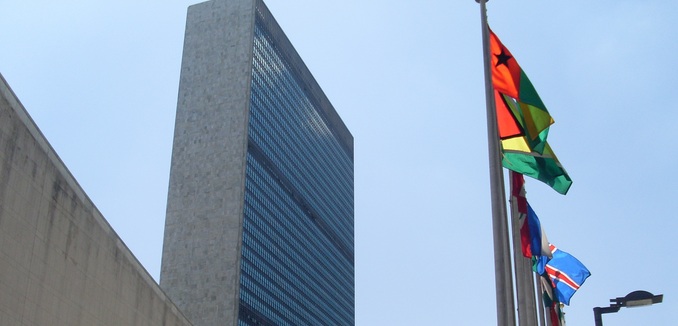In the May 2014 issue of The Tower Magazine, Ben Cohen examined The Deep UN: Inside the Secret Infrastructure of Hate. While, as Cohen previously noted, the United Nations pursues some worthy goals, it nonetheless possesses “a network of extremely well-funded UN structures and offices” that “continue operating as the engine of the effort to delegitimize the Jewish state and attack it through boycotts, sanctions and divestment.” Even though the odious “Zionism is racism” resolution was repealed in 1991, its effects are still being felt.
Except that, as is often the case with the UN, nothing is ever as simple as it seems. The claim that Zionism is a form of racism was not confined to a single resolution. It was and still is essential to the position that many UN agencies take on the existence of Israel, the ongoing Arab-Israeli conflict, and its subset question of Palestinian statehood. This attitude is predicated on the ahistorical assertion that Israel is a state dominated by non-indigenous colonizers, and thus Israel’s primary mission is to frustrate any and all attempts at self-determination on the part of the “indigenous” Palestinians. That this attitude is still embraced is painfully visible through the activities of the UN’s “Division for Palestinian Rights” and its related committees—an infrastructure created by another resolution the same day the UN declared Israel’s very existence to be “racism.” Most importantly, it is a view that continues to inform and guide Palestinian unilateralism and the accompanying efforts to delegitimize Israel at the UN. As Abbas has again demonstrated, the legacy of Resolution 3379 is alive and well.
Citing the work of the American Jewish International Relations Institute (AJIRI), Cohen explains that the origins of this infrastructure goes back to “the early 1970s, [when] Fidel Castro and Muammar Qaddafi began a campaign to take control of the General Assembly’s agenda,” intending to “embarrass the United States and delegitimize Israel.” This architecture is so embedded in the structure of the UN that Israel “was the subject of no fewer than five condemnations in the winter 2014 session alone, while only one resolution addressed the horrific use of chemical weapons and barrel bombs in Syria.”
Underneath all of this public-facing hate speech posing as concern for human rights, however, is a more secret bureaucracy aimed at undermining Israel’s legitimacy around the world. At the heart of what AJIRI calls the Palestinian “propaganda apparatus” is the Division for Palestinian Rights (DPR), a component part of the Department of Political Affairs. With an annual budget of around $6 million, two committees operate within the DPR, cumbersomely named the Special Committee to Investigate Israeli Human Rights Practices Affecting the Palestinian People and Other Arabs of the Occupied Territories and the better known Committee on the Exercise of the Inalienable Rights of the Palestinian People (hereafter referred to as the “Palestine Committee”).
As with United Nations Relief and Works Agency for Palestine Refugees in the Near East (UNRWA), which was scrutinized by Assaf Romirowsky in the May 2014 issue of The Tower Magazine, the DPR makes peace more remote by normalizing the delegitimization of Israel and giving the Palestinians no incentive to come to terms with the Jewish state. Read Cohen’s complete essay here.
[Photo: Dendodge / WikiCommons ]




